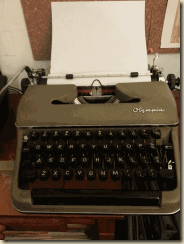TYPEWRITER REDUX
I graduated from high school in late spring of 1956. My graduation present from my parents was a new Olympia SM3 portable typewriter. It was the first in a long series of typewriters I collected—just as my Esterbrook fountain pen acquired a year earlier was the first of scores of fountain pens in my collection. I still use that old Esterbrook and it remains my favorite pen.
I've given away all my typewriters, replaced now by an endless string of computers.
My first experience with computers was in the spring of 1958. It was my sophomore year at USC, and the computer was a Honeywell—their first entry into the computer market. I learned programming, card punching, and how to deal with large computer printouts. I also learned how to ferry all those cards and all that paper on special carts without spilling it all—a computer user’s nightmare in those days.
All this has come back to mind because my wife asked me what I wanted for my birthday. What sprang instantly to mind was a manual typewriter!
As I began to research this desire, I was surprised to find that typewriters were still being made. But I could tell they were all plastic and cheap and unlikely to last long, as is the ethos of the modern consumerist culture. What rose up in me was the desire for "the real thing," a typewriter made of metal, a typewriter that was built with precision, a truly crafted typewriter.
In short, I began to lust after my original typewriter—that O1ympia SM3.
A few quick pecks into Google and I was linked to an excellent refurbished model of the Olympia SM3. I learned it was one of the best manufactured typewriters built to high standards, of high quality materials, design and craftsmanship in post-war Germany—a kind of Mercedes or Porsche among typewriters. The proprietor had just decided to sell it because he had found an earlier model for his permanent collection. He gave it one last work-over and in a few days it was on my desk.
As I typed this blog entry, I experienced wonder that my fingers remembered how to strike the keys to make them work properly—nothing at all like the soft silent touch of the computer keyboard.
I love the touch, the sound, the slowness, even the errors. The machine needs no electric power and no connection to the Internet. It feels "right" in some way I cannot articulate. I don’t think this is the romantic nostalgia that so often grips people of my age (I will be 78 later this month). The closest I can come to expressing this inchoate feeling is that more and more we seem to be serving the machine, rather than the machine serving us. This echoes the much-neglected thought of Lewis Mumford (see for example, his Art and Technics published in 1952). He argued for the primacy of the person and it is personhood that is being "replaced" by the machine (robotics, artificial intelligence, and the mechanisms of commodification).
Hey, Mr. Thomas Wolff, maybe we can go home again. I do feel "at home" with this machine. And I have company. Though I am not a fan of any of Danielle Steel’s 100 novels, I do like the fact that she typed them all on her 1946 Olympia typewriter!
